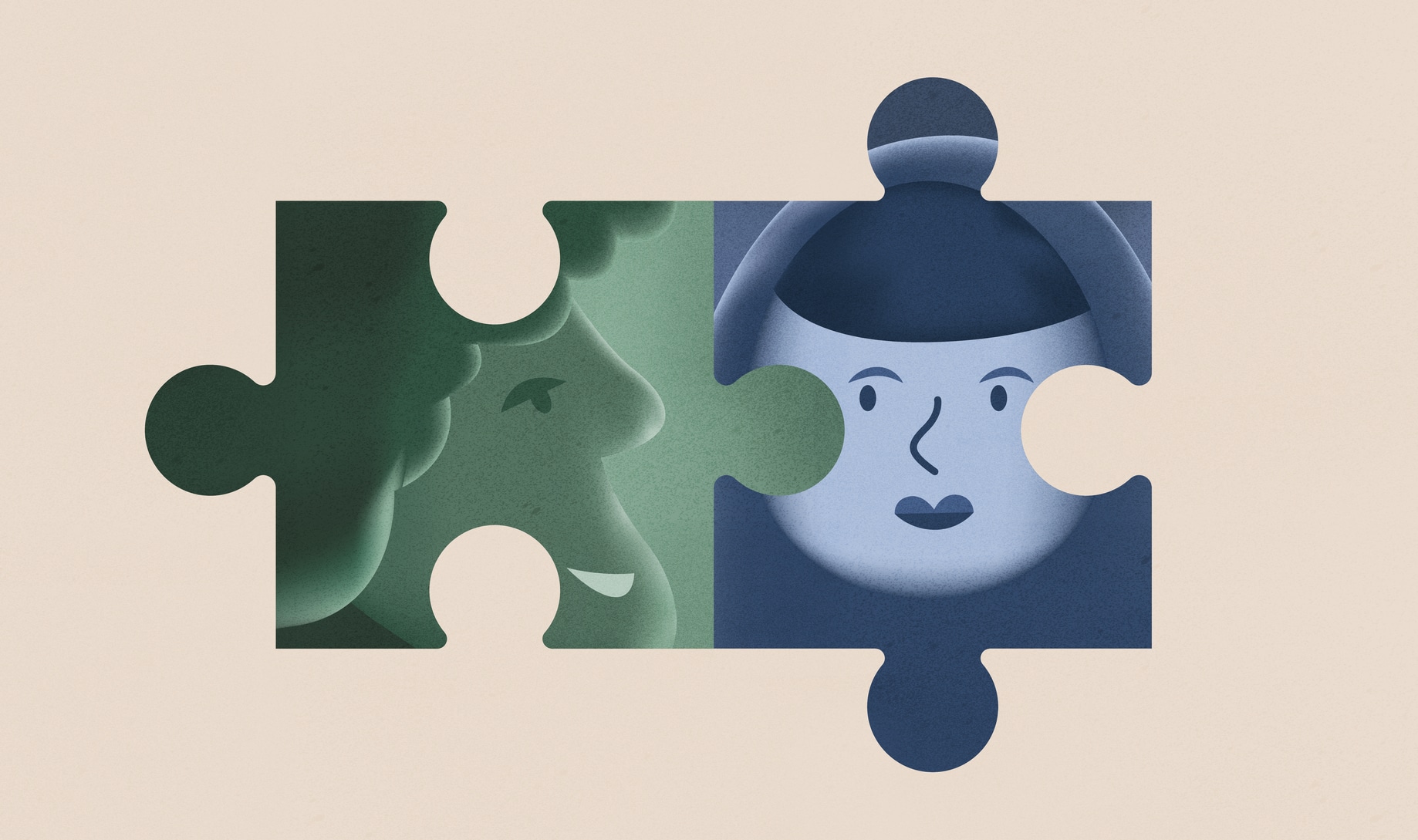
Deciding to go to therapy is a big step—one that might come with a lot of questions about how to find the right therapist and how to know if the one you choose is a good fit for you.
The answers to these questions are different for everyone. We all have unique experiences, perspectives, and motivations that greatly influence the care and providers we prefer.
Finding the right therapist is a crucial first step for effective therapy, and there are many layers to what makes someone the “right” fit. As you consider what to look for in a therapist, keep these research-backed principles in mind—they’ve also been proven to support successful treatment outcomes.
#1 Consider whether identity-matching is important to you
Many people believe finding the right therapist comes down to identity matching, or working with someone who shares an identity with you. For example, some members of historically marginalized communities might feel more comfortable working with someone who shares their background or lived experience. There’s an unspoken relief that comes from interacting with someone you don’t have to explain certain aspects of your experience to—they just “get it.” They get you. At Lyra Health, we offer matching based on race/ethnicity, gender, and LGBTQIA+ identity, plus we have providers with specializations in different religions and working with veterans.
#2 Choose a provider you feel you can trust
Countless research shows people need a therapeutic relationship that’s built on understanding and trust. This bond between client and therapist is called a strong therapeutic alliance. It’s one of the greatest indicators of success in therapy, even more than other considerations like a therapist’s approach or theoretical orientation.
The therapeutic alliance strengthens when a client trusts their therapist and feels willing to work toward shared goals together. Identity matching can be a useful tool to establish a therapeutic alliance more quickly, especially when someone feels more guarded and unsure. For example, if you identify as a member of the Latinx community or the Black community you might find it easier to open up with a Latinx or Black provider. While this may be true for many, it’s important to know there are still other ways to establish trust and connection with your provider outside of shared identities.
#3 Look for cultural humility
Cultural humility is one of the key ingredients when evaluating how to find the right therapist. Cultural humility is measured by a therapist’s commitment to lifelong learning and adapting their approach to working with diversity—no matter what identities they hold. This means they view multicultural learning as an ongoing process, not a point of arrival. A culturally humble therapist is committed to challenging their blindspots and biases by seeking out opportunities to understand the histories and cultures of the communities they support.
A culturally humble therapist engages in ongoing self-reflection and cultural awareness. They acknowledge their limitations, meaning they’re able to admit when they don’t know something. Above all, they’re committed to learning more about clients’ individual experiences, meaning they make an effort to know you rather than making assumptions.
#4 Evaluate the therapist’s cultural competence
A therapist’s ability to put cultural humility into practice while working with clients is known as cultural competence. A culturally competent therapist will seek to understand your unique experiences and invite regular feedback throughout treatment.
For example, they’ll likely ask questions about how you identify and how your cultural influences shape your experiences, including the ones that may have brought you to therapy. They’ll collaborate with you to set goals for therapy and define what progress means to you. In other words, a culturally competent therapist will be able to adapt and tailor the therapy experience to your specific needs and background to enhance therapeutic outcomes.
#5 Identify areas of specialized training
Training and expertise play an important role when evaluating how to find the right therapist. You want to work with someone who specializes in working with the concerns or goals that are bringing you to therapy.
This is another reason identity matching might not be someone’s top priority. If a therapist lacks training and education on the topics you want to address, they likely won’t be a good fit for you, even if they share the same sexual orientation or cultural background. Both are important considerations, though. Specialization won’t be enough if you don’t feel the therapist is culturally responsive. Remember: identity-matching isn’t the only way to access culturally responsive care, but if you feel more comfortable with someone who shares your identity, that’s OK.
How to access culturally responsive care
If you’re ready to meet with a provider for a consultation, here are some questions you can ask to help you find the right therapist for you:
- How would you describe your training or experience with addressing social identity in therapy?
- Do you have any specialized training in working with my primary social identities?
- How would the identities I hold impact the way we set goals and the type of goals we set?
Their answers should help you to assess fit across three main areas. Reflect on your conversation and ask yourself:
- Comfort: Would I feel comfortable working with this person?
- Cultural competence: Do I believe they can understand my experience?
- Provider specialty: Do they have specialized training in what I’m hoping to address?
As you move through your care journey, remember that it is just that—a journey, not a destination. It’s OK if you don’t feel a connection with the first person you have a consultation with. Keep trying! Even as a mental health professional myself, it took a few tries before I found the right therapist for me. You may not feel comfortable with anyone right away, especially if seeking support is new to you. If you need a few sessions to open up and feel out the relationship, that’s OK too.
For members of historically marginalized communities, there may be an added layer of mistrust given the history of neglect within health care systems. If this resonates with you, identity matching can be a helpful place to start. Remember, you can end the therapeutic relationship any time if you feel like it’s not a match. Don’t give up, though. Remember—just because one therapist isn’t for you, doesn’t mean therapy isn’t for you. Your mental health matters, and finding the right support for your needs is worth the work.
At Lyra, we recognize that every person has unique needs and preferences as they evaluate what to look for in a therapist or mental health coach. That’s why we offer identity-based matching for clients who consider it essential for their care. All care through Lyra is tailored to a client’s unique needs and cultural backgrounds, regardless of the provider’s identity. Lyra providers and fellows receive ongoing training, clinical consultation, and assessments to strengthen their culturally responsive skills and approach. Grounded in respect, humility, and evidence-based practices, we strive for all clients to feel validated and supported in their sessions.
Start your care journey
You can get started today if your employer offers Lyra
Sign up nowPrioritize your emotional well‑being.
Join Lyra today

